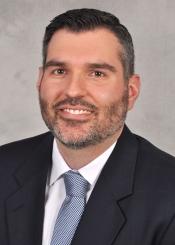
马克·伍德福德博士
当前预约
LANGUAGES
WEB资源
RESEARCH PROGRAMS AND AFFILIATIONS
研究兴趣
Heat shock proteins (Hsps) are a subset of molecular chaperones that function in all subcellular compartments both constitutively and in response to stress. The Hsp90 chaperone TRAP1 is primarily localized to mitochondria and controls both cellular metabolic reprogramming and mitochondrial apoptosis. TRAP1 upregulation facilitates growth and progression of many cancers by promoting glycolytic metabolism and antagonizing the mitochondrial permeability transition that precedes cell death. TRAP1 attenuation or inhibition induces apoptosis in cellular models of cancer, identifying TRAP1 as a potential therapeutic target in cancer.
协会/会员
EDUCATION
研究抽象
Heat shock protein-90 (Hsp90) is a molecular chaperone involved in the folding, 稳定, and activation of hundreds of cellular proteins. TRAP1 is the dedicated mitochondrial isoform of Hsp90 and participates in the regulation of metabolic flux, 钙稳态, and mitochondrial apoptosis. TRAP1 is upregulated in many cancers, and isoform-specific TRAP1 inhibitors have shown anti-cancer activity in pre-clinical evaluation. Post-translational modification (PTM) is an important regulatory mechanism for Hsp90 molecular chaperones, however little is known about the post-translational landscape of TRAP1. Our lab works to understand the role of TRAP1 activity in mediating tumorigenesis and the impact of PTM on the biological role of TRAP1 in our cellular models of kidney, prostate, 膀胱癌.
